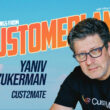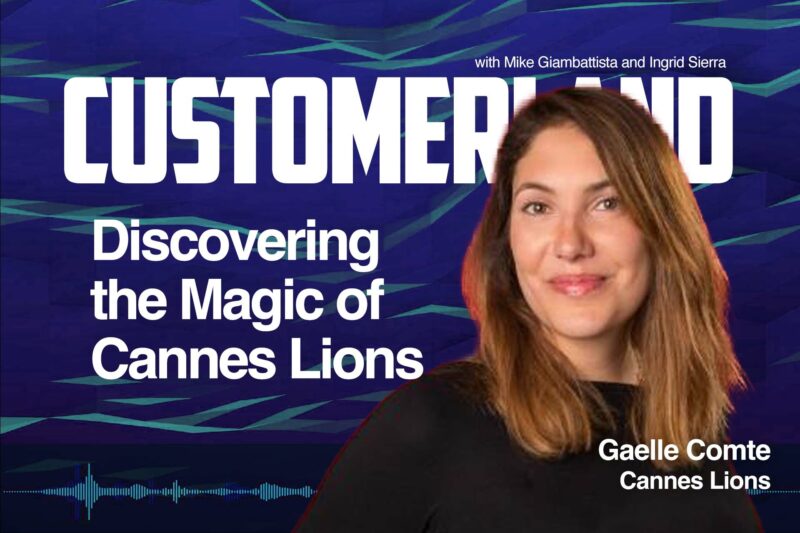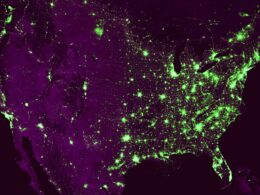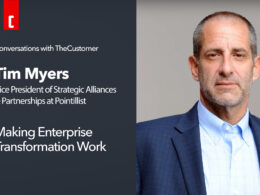Ingrid and Mike sit down (virtually) with Gaelle Comte of the Cannes Lion Festival to discover how the Lions Awards have evolved into a standard of creativity, championing diversity with innovative initiatives and tapping into the potential of AI. In this episode, we reminisce about the 2021 Cannes Lions International Festival of Creativity, marvelling at the diversity initiatives that made it an inclusive event, and recognizing the empowerment it brought to female leaders through programs like ‘We See It Be It’.
Join us as we dive into the fascinating multidisciplinary approach of the Lions Awards. Reflecting on how the festival has grown, we bring you insights on the new subscription platform, intelligence platform, and other groundbreaking initiatives. We also take you on a tour through the vibrant landscape of the Lions Awards, uncovering industry trends, brand insights, and the treasure trove of winning work. From reminiscing about the French TV program Culture Pub to examining the impact of the Internet on the advertising industry, we have it all covered!
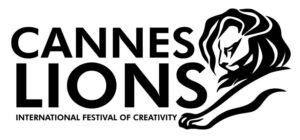
We also examine the rise of AI in creativity and its potential to generate challenging ideas at scale. We underline the significance of user need in the expansion of the Lions Awards and how it has become a benchmark of creativity. “We believe representation and diversity in the creative industry can play a critical role in winning awards and commend the efforts being made to ensure that jury members and other people on stage represent our diverse society.” Tune in for a thought-provoking, insightful, and entertaining episode!
Full Transcript Below
Mike Giambattista
I’m first of all admittedly a little bit awestruck by the fact that you work at the Lions, because I have never been there. I’ve always, always, always wanted to go, and you apparently get to do this over a year.
Gaelle Comte
Why don’t you join us? Well, maybe.
Mike Giambattista
I should, yeah, forget this New York stuff.
Gaelle Comte
It just sounds.
Mike Giambattista
It just sounds. So I mean the reality can’t be as good as the fantasy, but the fantasy is quite good.
Gaelle Comte
It’s better because I did my first festival last year and I had some expectations as to what to expect and I was expecting a lot of inspirational talks. But I think when you see and when you speak to winners and you see them go on stage and you chat to them and they say, oh, this is just going to change my career, you don’t understand how much it means to me. It suddenly lends it home because basically the awards are core to Ken Lions, obviously, and then around the awards, which started in 1954, we built a festival and then we built other ancillary products. But really the benchmark is what makes Lions and for me, seeing that really landed it last year.
Mike Giambattista
So that was year one for you.
Gaelle Comte
That was, yeah, that was my first year last year and yeah, and this year was even better, basically because, you know, we didn’t have the COVID cloud hanging over us that we did in 2022, where we had some delegates who didn’t know whether they’d be able to get into the country and we didn’t know whether that’d be. You know, the last lockdown in the UK was, I mean, Ingrid correct me if I’m wrong, but I think it was early January that year, January 2022.
Ingrid Sierra
Yeah, so I imagine planning the event must have been a nightmare, right.
Gaelle Comte
Yeah, well, I think we sort of waited and sort of did some planning and suddenly in March, april, it looked like he was going to go ahead. So suddenly everything sped up. Yeah, I think that the difference from last year was just light and night and day. And again, I don’t have, obviously, the comparison from previous years because, although it was in marketing and advertising in the past that I didn’t make it to Cannes Lion, but this year was so much better, it was even more vibrant than 2022, which was our big reunion for a lot of industry experts and guests.
Mike Giambattista
And we need to just make up a policy for the customer next year where we need to do this and can.
Gaelle Comte
I mean, yeah, set up a little studio in the ballet and the interview, lose the people as they come off stage, or I think that’s a great idea.
Mike Giambattista
You have sold me, you’ve sold me.
Ingrid Sierra
It took six minutes.
Gaelle Comte
I think he arrived and Mike was already sold to the idea.
Mike Giambattista
So you know, there’s that, sorry, no, no, go ahead.
Ingrid Sierra
I wanted to ask Gail, as we were talking about this year, so are there a few things that did stand out for you in terms of winners or talks or inspiration?
Gaelle Comte
I think, personally, my more general highlights were, you know that that that freedom that came, that not having covered hanging over us, that was definitely, you know, a marked difference between this year and last year. I think we also had a much more diverse audience, and by that I mean that the people you know, the delegates coming to the festival, and I think that was potentially supported by loads of different initiatives, including some of the ones that we got involved with, like we do see it be it, which is about empowering female leaders and making sure that they’re represented in the industry, and it’s a cohort of 16 female leaders who, you know, we bring to the festival and we put them through a whole learning program. But we also had scholarships for the first time this year, where we brought people with not a lot of experience in the industry whether they’re young or whether they retrained and, you know, started to crash and again to give them this opportunity for learning. And then we partnered up with the Black British Network and Cephas Williams as part of their Blackout 2023 initiative, which was to bring loads of black talent in the festival, and I think I think it really showed, basically, and it made it.
It made it a lot more diverse and a lot more exciting, and I think I mean there were so many talks I saw I can’t even pick one really, because I saw so many inspirational people on stage. You know, I saw a Hispanic advertising leader come to talk about the Hispanic pound and it’s not necessarily something that we think about in Europe, but actually it’s a huge opportunity to talk about how brands should tap into that. And I also saw a film premiere in the TBC theater from, again, an agency founder from the 70s who was basically sharing his journey through the decades and setting up an advertising agency in California, which was amazing. But it’s, I think that’s the beauty of the program, where you’ve got so many different tracks, so many different topics that you can almost, you know, choose your own adventure.
Mike Giambattista
I’m struck by a couple of things that you’ve said. One is one is that you can’t remember just pick out a few, because there were so many good ones and, having attended an insane amount of events throughout the course of my career, there are probably three talks that I can remember only because they were any good. I mean, there’s a dearth of good material in many of the, in many of the events that I’ve attended, and and lion is just the opposite. It’s apparently packed with.
Gaelle Comte
Yeah, it’s packed. And also, what I find really interesting is that we also bring creatives from other industries. So we had, you know, the creatives behind the the white latest TV show, for example. Or Louis Thieroux came to talk about his creative journey and how he six inspirations, and I think that’s what makes it really attractive, because you don’t just hear from the industry legends although they’ve got amazing stories but you also get the perspective from people outside of the marketing and advertising industries. Basically, so, what was your favorite talk?
You said you can remember two or three words.
Mike Giambattista
Oh, this is out of all the years, I think one that comes to mind which is way more boring than anything you just mentioned about. Four years ago, I was at an event and the people from Starbucks were presenting about their loyalty program, which again already sounds boring, but the technology that they had developed and the way they were deploying it allowed them to at the time I don’t know if you’re a Starbucks fan or you have their app but to create offers in real time at a scale which was never before achievable. They have millions of people on their app, so, one by one, they’re able to understand your activity and your preferences and present offers to you in real time that were just. It blew my mind. Now that’s commonplace, Everybody can do that, but four or five years ago that was a real deal.
Gaelle Comte
And the other ones are probably.
Mike Giambattista
I remember them more because how bad they were.
Gaelle Comte
Not gonna talk about them.
Mike Giambattista
I’m not upset, anyone Not good at all, you know just a few like that. But the other thing too is and is that I don’t know if Ingrid mentioned this to you, but we’re working on an event, a 2024 event, that is kind of a cross-discipline event as well. It’s marketing and advertising, kind of deep within those niches. But uniquely, we’re doing something that you guys are already doing and have been for some time, which is bringing people from adjacent industries and disciplines and skill sets so that in your world it’s creativity, but in our world it’s more about the disciplines of marketing and customer engagement, so they can hear how other people are doing this outside of their verticals, outside of their silos and their little worlds. And we think there’s enormous value in that and I feel like you just proved my point that it’s working for you, so it has to work for us.
Gaelle Comte
Definitely.
Mike Giambattista
So we’ve mapped out a handful of things we wanted to touch on for you, but I think first can you just for context, tell us about your role there and then maybe we can talk through some of the challenges and highlights of your role and then we can kind of roll through some of the questions that we don’t want.
Gaelle Comte
Yeah, definitely. So I’m sure you can tell from my accent I’m a French-London. I’ve been in the CAFO for close to 20 years and initially I started my career in advertising and marketing. So I’ve worked with big brands, mostly D2C, like Carrefour, noirhouse or Virgin, and a couple of years ago I was approached by Lions to come and look after the digital products because they’ve got we’ve got this amazing festival in the South of France, but we’ve got so much more that people don’t necessarily know about, one of them being this subscription platform called the Work, which is an intelligence platform with loads of insights, all of the winning work from the past two or three decades and really tangible tools to inspire creatives and inspire brand marketers.
So I guess this really appealed to me because it was moving slightly away from marketing but moving more into product management and almost general management of a business, because it’s almost like Lions. I’ve got really four different businesses into one because we’ve got the event. We’ve got Lions Intelligence, which is my digital platform. We’ve got Lions Advisory, which help brands go on their creative journey, and then we’ve got Lions Learning, which is a lot of on-site academies, cmo accelerator and soon a digital product as well, and I just thought that was a great site step into a broader role, basically of leading a product, and that’s what I’ve been doing for the past couple of years.
Mike Giambattista
Wow, wow, it sounds fascinating. So you have the rights to the past several decades of winning work to broadcast that or sell it or license it, however you can. Oh my gosh, that’s just.
Gaelle Comte
Yes, we’ve got all the case studies. We’ve got all the case studies and it’s really interesting because obviously from that benchmark data we derive a lot of trends and insights and we try to unlock the behind the scenes because it’s not just you know. Oh, it’s a great creative work and therefore it’s winning. There’s a lot of insights and intelligence that goes into this. We do a lot of deep dive into industries or deep dive into specific brands. For example, we’ve recently looked at Nike and their progression over the past years when they started to reinvest in creativity, and how it’s basically impacted their business results. So it’s really quite varied.
But yes, we’ve got a big, big database of winning work and case studies and also all the entries, even if they weren’t awarded, and we also have a part of the platform which is free for anyone to view, which is called the Work Classic and it’s looking at all the winning work from the 50s. So you can see the first Grand Prix that was awarded in 1954, and I personally find that fascinating because at the time it was more. It was more a piece of movie, basically, rather than a piece of advertising.
Mike Giambattista
Yeah, if we ever get together in person and we’re all sharing a bottle of wine, we’ll tell stories about that, because I’m old enough, almost, to remember those days.
Gaelle Comte
Well, I mean 17 years you haven’t been to Can Lion. I agree with you, it’s a complete change.
Mike Giambattista
Something’s wrong with my life. It needs to be fixed. Badly, oh my gosh. Well, all of that because I’m one of these people who I could sit and watch advertisements all day long. It’s my favorite thing to do, and there isn’t, there’s no place that has compiled the best of the best. So I think you’re really onto something.
Gaelle Comte
I’ll give you access so you can have it. When I was growing up in France and when I was a student, there used to be a TV program on Sunday evening called Culture Pub, which is an advertising culture, and it was all about sharing the best ads from all around the world, from the previous week and obviously in these days. The internet was in infancy I don’t think YouTube existed yet so that was the only place where you could see that. And then once a year, in different cities around France, they used to do a night of advertising, so you’d literally go to the cinema at 8 pm and you’d leave the following morning at 8 am. Oh my God no wonder yourself would see what dance we are.
Ingrid Sierra
It was called La Nuit La Pub, so the night of advertising, and that was the best thing ever. I completely forgot about that, Gail. You didn’t bring it to life again. And Culture Pub was totally the Sunday night admissible. It was half an hour and it was so good. And yeah, it’s true, we are. We probably are more focused on that in France because I don’t think any of those things exist in the UK.
Mike Giambattista
That might be the case, definitely not in the.
Ingrid Sierra
US. Yeah, but that might go with the creativity around cinema and things like that as well, so that’s very interesting.
Mike Giambattista
So culture pub if it’s not trademarked, we’re starting it here in the US, Our next venture in grid.
Gaelle Comte
It sounds like a drinking venue.
Ingrid Sierra
Yeah, we could do that too. You have to pronounce it the French way, which is pub and not pub.
Mike Giambattista
Really Okay, but what’s so in France? What does that word mean?
Gaelle Comte
Publicity.
Mike Giambattista
Oh, okay, publicity Right, because to me it was a problem. Yeah, yeah, okay, we have some cultural barriers to cross here, clearly, so my mind’s gonna spin on that because I’m just fascinated by it, but I won’t bother you with all of that right now. Let’s talk about, if we can, some of the highlights from this year’s festival. You were there. You have some context. You’re a fan of this stuff, as we are, so what were some of your personal highlights?
Gaelle Comte
I think yeah, I’ve mentioned a couple around more diversity. Obviously, we didn’t have COVID hanging over our heads, I think we also. I loved how brands showed up this year at the festival and by that I mean our partners doing activations on the Crasette, because obviously we saw some amazing activation and Pinterest built on what they did last year to make it even bigger and better, and it was almost like walking into a Pinterest mood board when they were on that beach.
And we had other partners like McDonald’s created a McFlurry ice cream van for CMOs which was great which was in front of the ballet. We had the biggest Cheetos sculptor in the world which was celebrating their win for their Cheetos dust campaign last year. So it was all those great activations which it just makes you feel great to be part of the industry, because people are just really passionate about what they do, they’re passionate about their brands and they’re really keen to showcase what they do to the world. If you’re asking more from a trans perspective, I guess one of the things that we saw this year and I’m sure it’s gonna surprise you but the rise of AI.
Obviously AI is everywhere at the moment and when we analyzed our award entries, we saw that the proportion of entries mentioning AI in the entry doubled compared to last year. So we went from, I think, 3.7% to 7.3%. But the interesting thing for me, it was AI as a tool rather than AI as a threat or AI as a replacement for human creativity. It was more a way for people to make challenging ideas more realistic or maybe to give a client with a lower budget the opportunity to still develop their idea at scale. So that was an interesting twist. I think on it. You know, on the so, so yeah.
Mike Giambattista
I’m sorry. I just wanted to ask what we’re still on the AI topic. I’ve seen a handful of adverts that were created using AI and they all the ones that I’ve seen so far and, granted, this is not a big universe, I’ll see like they were using AI as more of a novelty to be able to say that this was created by AI, and I’m waiting for that moment when we cross from it being a novelty into it, as you said, being a common part of the tool set, just to see where creativity goes.
Ingrid Sierra
But I also think, mike, we’ve crossed that line now of like, oh, this is cool, it’s been created by AI and people write it on it. I mean we’re not going to be doing it, but we’re going to be writing it on it. I mean, when you see people’s posts and they say it’s been written by AI, I think it was fun week one when everyone was experimenting. We’re way over it now. So things change quickly. Yeah, did you?
Mike Giambattista
see that. Go ahead.
Gaelle Comte
Did you see that ad by a momentum method? That’s Ryan Reynolds’ advertising agency, where they literally got AI to write a script and just Ryan Reynolds reading it that you’re mentioning in the grid? Where it was just fun, because it was done using ChatGPT rather than.
Ingrid Sierra
Exactly, but it’s interesting and I’m actually pleased to hear what you’re saying about like this is a tool and a support, rather than people really seeing it as a risk to the future of creativity, because I think I think that’s generally what we as marketers all feel right now and probably also hope to see. But seeing that it’s coming from a kind of much broader range of experts in the industry is quite good.
Gaelle Comte
I personally think that we need to add some legal framework around AI and we need to think about ethics, because I think, from an independent creator’s perspective, if their illustrations, for example, have been used to train AI models, I can understand why it feels like they’re not, so they need to be remunerated. So I know there’s been controversies around that. There’s been controversies around the likeness of famous people as well, being used in some deep fakes, and you know. So you can see the issues, but the general idea was AI as a tool. We had some Intel one, I think a gold lion, in Created B2B for the Human Certified campaign, which was a way for businesses and individuals to basically recognize or identify deep fakes, and I think we’ll probably see more of these tools being rolled out in the future to help with that.
Sponsor Announcement
I want to take a quick break from the conversation to tell you about one of our sponsors. What could you achieve if you knew what your customers expected ahead of time? What if you could know what customers expect by category and by brand 12 to 18 months ahead of traditional brand tracking methods? And what if you could know exactly where to adjust and where to spend in order to derive the most benefit every time. A customer expectation audit allows you to identify areas that require strategic reinforcement, as well as pinpoint which values will contribute most to an emotional bond with your brand and optimize accordingly.
Customerland has partnered with Brand Keys, the world’s oldest loyalty focused consumer research firm, to bring real world customer expectation audits to brands, brand managers and to CX practitioners everywhere Want to know where your brand stands and exactly what to do about it.
Go to expectationaudit.com and download a sample audit today.
Gaelle Comte
Were there any?
Mike Giambattista
pieces that you saw, that you can recall that where AI was used as part of the creative process, but it wasn’t all about the AI.
Gaelle Comte
No, not this year. We saw some elements where they were used as part of the research process or to bring some ideas to life in the initial stages of the creative development process, but not necessarily as the end result. So on our Lions Intelligence platform, we run a competition or a challenge every year where our members can join. We team them up in teams of five from all around the world, which is quite nice because then they get to work with people from outside their industry or their agency or their brand and they work on a pro bono challenge to help charity.
And last year we partnered up with Great Ormond Street, which is a global charity to fight cancer in children, and our winner actually used AI to create their winning work. So although it’s not Lion Awarded, it’s still a very creative campaign where obviously the charity did not have a lot of budget. And this team just came up with this concept of creating AI dolls, because their original insight is oh wow, the cancer cell looks like a plush, fluffy toy. Oh, what if we created those AI dolls and then we sell them as NFT art to help fund the efforts from the charity?
So I think that was an interesting, creative way of dealing with a low budget and including AI in your creative output.
Mike Giambattista
We’ll have to look for it.
Ingrid Sierra
That brings a question to my mind, Gaelle and maybe you have that as part of your stats on your mentions Did you see a change in the mentions of web free, including like NFT, metaverse, etc. Compared to the year before?
Gaelle Comte
That’s anecdotal, so it’s my perception, rather than data points, but I haven’t seen much work mentioning the metaverse at all this year, whereas last year there was loads of elements of it and I wonder if it’s almost been superseded by AI in the thought process.
So it’s been really interesting because we saw some really interesting pieces of work last year, you know, one of them being I don’t know if you remember, but a video game Burger King sponsoring a very small team in football team in Wales, because all of the I’m not very good at football, so bear with me, but all of those soccer teams are included in a video game. And basically there was a way for Burger King to get very famous football players wearing the Burger King logo and their t-shirts. And again, it was a community driven campaign where then they asked people to select that team and if they did, they would get Burger King discounts. But that was a really cool example of, you know, bringing the metaverse to life. But I can’t yeah, I think it’s anecdotal, but I don’t think we’ve seen that many metaverse pieces this year.
Ingrid Sierra
Well, to be fair, I think that completely follows the general trend of like what you see in the news and new things coming up. So and I completely agree that it’s probably been completely like overtaken by AI this year. So looking forward to this conversation next year.
Gaelle Comte
But you’re still doing improv in the metaverse in Grid, so clearly I am doing improv in VR, but I’m totally ahead of that. Bucking the trends.
Mike Giambattista
Well, next year it’ll all be AI driven. You won’t have to do any improv, you can just be so. 70 years is a lot of longevity for any event, especially in media, and yet the Lions continues to be the center of the universe for all of marketing and advertising worldwide.
Gaelle Comte
Gonna make me blush.
Mike Giambattista
I’m just stating facts. So one series of questions I’d love to just unpack with you and we may not even have time today is how did it become the center of the universe? And then, correlated to, how do you sustain that kind of I don’t know worldwide impact?
Gaelle Comte
over time. That’s a really interesting question and if I think back, I think it really goes back to user need, basically Because if you think back about the origin of the festival in 1954, it’s actually a group of industry advertisers who thought, hang on a second. The Cannes Lion Film Festival are rewarding movie makers. We are also making art and there’s a lot of craft going into the work we produce and therefore we should be recognized for that work. And I think, if you think about it, it was really driven by that community of makers and therefore that’s something that industry and those people wanted.
And I think over the years, the Lions have become, like you said, a benchmark of creativity and for the people that I met last year and this year when you speak to, especially a first time winner because the other one might be a bit more blasé about it, but a first time winner will tell you why it’s gonna change my career. It’s such a platform, you know, because they know that they’re gonna be able to step into a bigger role and they know that they’re gonna be headhunted. And we’ve got a great story of a creative, a young creative, basically one of our young lion competition a few years ago then went on to be promoted into creative director, then went to win a lion his first gold lion and then this year they were on the jury. So you can see, basically there’s a progression but it’s almost like it fast tracks your career. So for me it’s because it’s something that people recognize as useful and worthy in the industry and I generally think that the Lions team that’s not my part of the business, I can see it say it but the awards team is also very good at listening to what people want and basically making changes to reflect the industry.
So this year we launched the gaming lion because advertisers and brands in the gaming industry were saying there’s no category for us, but look at the great work we’re doing, we should be recognized for it.
And I think it’s true also of the talks that are being included in the festival. They’re very much steeped into user research and talking to our clients and our partners and our friends of the industry, just going what sort of inspiration do you want us to put on the program? And this was before my time, but obviously the festival suffered a lot during the COVID pandemic because there was no event. If there’s no event, there’s no revenue coming in. It was a very hard time and I think we had some amazing partners, like some of the holding companies, who actually supported us through that difficult times because they told us we still want you to be there at the end of the pandemic, we want there to be a festival, we want there to be the can lines, because it’s really important for us. So, again, I think it’s just recognized as one of the key benchmark for advertising, creatives, brand marks, and therefore that’s how we’ve been so successful for the past 70 years.
Mike Giambattista
I mean, you make it sound like it’s. It’s just a model that anybody could follow, but clearly there’s some magic there that you guys have been able to wield, find and wield that goes beyond just what the mere mortals can produce.
Gaelle Comte
I think it’s 70 years of relationships as well, right, 70 years of working with this partner. So obviously, if you wanted to start completely afresh, you’d have to build these initial relationships. But and it’s a massive operation we talk about it. I managed the digital platform and before the festival, we were chatting about our space in the basement. So we were doing an exhibition of the work and then people can come into the platform and play all the different video media and whatnot and we were saying, wow, aren’t we so lucky to have a space at Ken Lions and to have access to this massive event? Because anybody who started a similar digital platform could probably not afford to take over the entire basement of the palette. So it’s true that we’ve got a great opportunity there, but I genuinely think it’s basically been driven by our industry and our community of creatives.
Mike Giambattista
Yeah, I’m just thinking about. You know my perspective, as here in the US somebody’s been in the advertising world, who started in marketing because of a passion, a fascination by the whole, the whole thing. And our awards ceremonies over here tend to be more. I’m going to get in trouble for saying this, but our awards ceremonies are largely pay to play events. I might edit that out, but we’ll see there’s. You know there, yes, you’re rewarding creativity and spectacle to an extent, but so many of these are driven by look, I’m a well-paying sponsor, high paying sponsor. My client should get something here and nobody says it out loud, which is why I’m going to edit this, but it’s. But it’s.
Ingrid Sierra
We all know it.
Mike Giambattista
We all know it, I know.
Gaelle Comte
You’re right actually, I don’t know what events you’re referring to here, but I think if you don’t have the sanctity of the awards that are protected, then you lose the value and you lose the belief in your benchmark. So I think it’s something that you need to protect at all costs, basically, and that’s why we’ve got really strict rules as to who makes it as a jury president, who makes it as a jury. We’ve got guidance as to how they should conduct themselves during the judging process, but ultimately, we’re not part of that judging process. We just put in place the best experts of the year to work on that.
Ingrid Sierra
Yeah, and that’s why winning one has so much more value than winning probably many of those awards my client is referring to? Yeah, or even to be fair, even in the UK, I mean yeah.
Mike Giambattista
Yeah, interesting, and that’s not to say again. I don’t mean that as a pejorative statement, except to say, because I do know of some awards where integrity is is is their foremost quality, that’s the foremost intent, but those seem to be the exception at the rule.
Gaelle Comte
I think the way it works in our team anyways that there’s a there’s a divide between teams. There’s a team who help manage the entries and help will craft their entries, and then there’s a team that manages the juries and then there’s a team that manages the program and if you want to go on stage at Cadillions, you have to pitch, you know for what you want to talk on the stage, and it’s part of the call for content and very open and transparent, and I think that’s potentially how you can basically make sure that there’s no, you know, bleeding into one area and influencing into others.
Mike Giambattista
Basically, Um, you know, this is another potential can of worms here, but we’re going to go there anyway.
Gaelle Comte
So lose my wife again.
Mike Giambattista
Imagine that. How convenient. No, I’ve had these conversations and we have with our colleagues all over the place, but DEI efforts have become something of a double edged sword for so many companies because, on the one hand, regardless of your perspective, I think you have to acknowledge that those efforts are needed on some level, regardless of your political persuasion or where you stand on that on that particular spectrum. But they can also be a lightning rod for criticism or, you know, brand activism and those kinds of things, and you’re right in the center of all of that. You probably have a better view to the way that DEI efforts are being worked out in creativity and advertising than most. But I wanted to just ask do you, based on how you see it at the moment, do you think that DEI efforts overall if I can even make this kind of a statement have impacted creativity the way you see it at the Lions?
Gaelle Comte
I think I think the general consensus is that the more diverse voices you have in the room, the better your creative input, output rather and also the less likely your brand might my full pray to some kind of tone deafness that’s not taking into account other people’s perspective. I also think you know I’m reminded of that amazing campaign that won the titanium Grand Prix in 2021. It’s Dr Beats by Drays you Love Me campaign. I don’t know if you’ve seen it. I can send it to you after this call with you if you want to take a look.
But basically, I remember one of the jury members, Trevor Robinson, who’s creative director at Quiet Storm, who explained in an interview that if he hadn’t been in the jury I’m judging this work it probably wouldn’t have won because he was the only person in that room giving the perspective of a black man in the creative industry, a black person in the world, and therefore he was able to advocate on behalf of this campaign, explain how impactful it was for for this community and, you know, basically convince the other jury members to award it.
So he might have won without him in the room, but it might not have won and I think it’s really important to get this representation and that’s why we’ve been doing some work with the DNI consultancy, called the Unmistakable, to help us make sure that our jury members, the people that are on stage, are very representative of our society and that we’ve got more diverse voices in the room. I think, generally, when you think about some backlash about brands over the past few years, I think it’s because it lacked and I’m not going to give any examples, but I think it’s because it lacked someone in the room who was able to give a female perspective on something or you know, another lens basically. So I think, generally, it’s good to have diverse teams and you get more ideas and you also get, you know, yes, a better representation of all.
Ingrid Sierra
And it’s great because it seems that you’re making that effort at every single level of where you can impact it. So you were talking earlier about getting delegates from more diverse backgrounds, and then you have the jury and obviously all of that it’s a little bit of a bottom up approach and that means that at the top of all of that, the creativity is there, embracing that diversity, which is brilliant because you just infuse it from within and hopefully it grows organically and we don’t need to have that conversation in five years’ time.
Gaelle Comte
Yeah, I think I’ll see you. Simon Cook is a big champion of diversity and inclusion and I think you know, before his time, a general view was well, we’re just a representation of the advertising industry. So the people on our juries are on our juries because of their past experience, but obviously it doesn’t help fix any kind of systemic issues that they might be in the background. So I think having you know, holding ourselves accountable as to who we put on our juries and making sure their representative is really important. And, like you said, it’s more than just the people we employ. It’s also the people that we help give a platform to express their views. Basically, the.
Mike Giambattista
I’m making up a new term today called DEI washing, because I was thinking of you know, look, you know, you, your organization has hired a consultancy I think you called them the unmistakable to help, to help in that, in that regard. And you know, we’ve seen, we’ve seen, which I think shows a commitment, whatever that that relationship looks like, it shows a commitment on some level to those, those principles. And at least in this country, it’s really easy to see how companies have taken the idea of environmental sensitivity and those kinds of things and basically applied a sticker solution to it. You know, here’s our thing, here’s our campaign, here’s our, our person that manages that effort without any real cultural change. And but those are easy to detect. You know, I think if you see a company or an organization like yours, that’s making an investment.
Again, I don’t know what the unmistakable charges for their efforts, but you know there’s some, there’s some commitment there on lion’s part to make sure that happens. I think that’s the protection from. DEI Washing, if that’s even a thing.
Gaelle Comte
Yeah, and I get to Simon’s credit. He realized also that implementing the recommendations of the, the unmistakable required someone whose job it was to do this full time, because obviously otherwise people do down the side of the desk and then things might fall through. So our colleague, frank Starling, joined us back in April as our VP of DNI and he’ll be taking charge of our different talent programs that are here to help bring more diversity to can lines and beyond, and I think he’s also here to help bed this into the culture of the company. He started by, you know, running internal trainings around psychological safety and, and I think he’ll make a big impact and his team will grow and basically make sure that, like you said, it’s not DNI washing, it’s, it’s literally. We believe it’s the right thing to do and therefore putting our money where our mouth is.


